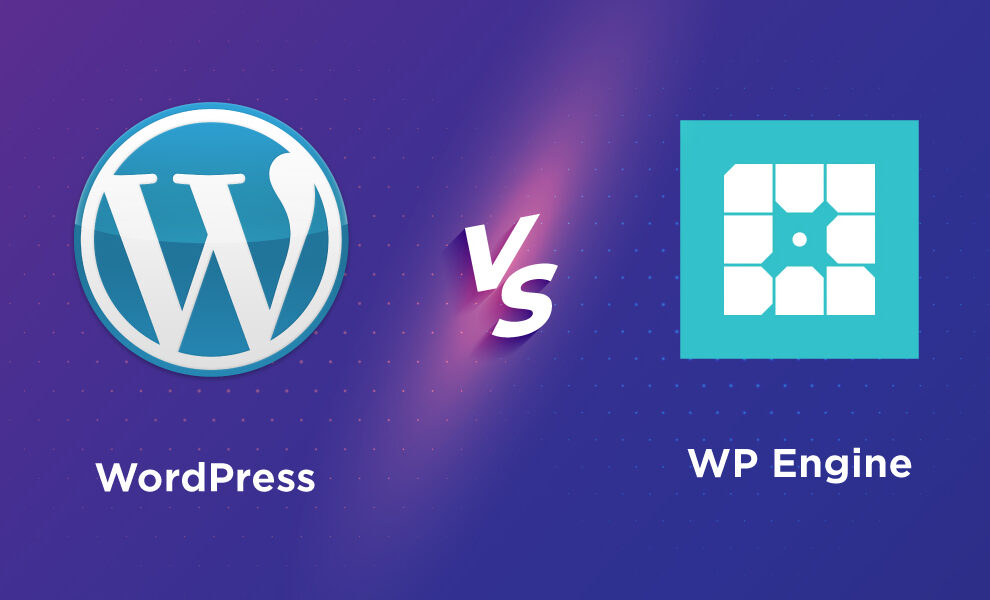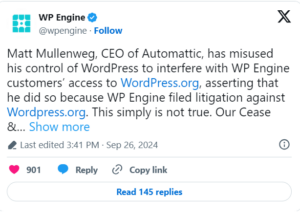WordPress, the in-demand technology for creating and hosting websites, is the subject of a heated debate against WP Engine. The main issue took place between WordPress Founder and Automattic CEO, Matt Mullenweg and WP Engine, a company that hosts websites built on WordPress.
WordPress is a free content management system (CMS) that gives authority to users so that they can create and manage websites. WP Engine has built-in security and scalability, making it easy to create experiences quickly.
WordPress and WP Engine are both well-known titans in the world of technology. So, this dispute is getting attention from the global audience. Let’s understand the situation thoroughly!
How Did the Dispute Take Place?
Midway through September 2024, Mullenweg, the blog’s author, referred to WP Engine as a “cancer to WordPress.” He objected to the host’s choice to prevent visitors from viewing and following the modification history of each post. Such a remark was just the beginning of the controversy between both parties.
Although Mullenweg believes this functionality is at the “heart of the user promises of protecting user’s data,” he added that WP Engine disables it by default in order to save money.
He criticized Silver Lake, an investor in WP Engine, saying that they don’t give back enough to the open-source project and that WP Engine’s usage of the “WP” name has influenced users to believe that the product is a part of WordPress.
The Lawful Conflict
WordPress and WP Engine debate further took legal steps. Mullenweg, the owner of the Trademark, threatened WP Engine with a “scorched earth nuclear approach” unless the latter agreed to pay a sizeable portion of its earnings in exchange for a license to use the WordPress name.
In response, WP Engine sent a cease-and-desist letter claiming that its fair use policy-protected its use of the Trademark. Then Automattic sent a cease-and-desist letter, claiming that the WordPress and WooCommerce trademark usage regulations had been broken.
The WordPress Foundation updated its Trademark Policy website and asked WP Engine to stop giving money to the Foundation so as not to confuse users.
Prohibition of WP Engine
Mullenweg then prohibited WP Engine from using any WordPress.org resources. Although plugins and themes are licensed under an open-source license, companies such as WP Engine are not responsible for the services they must operate to obtain them; the license does not cover this.
Impact on Community
The debate between both parties can impact a larger community. Numerous websites were damaged as a result, and plugins and themes could not be updated. It also made some of them prone to errors in security. This strategy of abandoning small websites to their fate did not sit well with the community.
The debate became a center of attention across regions because of global community’s involvement.
Trademark Conflict
There have been rumors that Matt Mullenweg, the CEO of WordPress, misused his power on the site to prevent WP Engine customers from accessing WordPress.org.
Mullenweg’s actions, according to WP Engine, interfere with the regular functioning of the WordPress ecosystem. This affects WP Engine and its clients, open-source users, and WordPress plugin developers who depend on WP Engine features like ACF.
Mullenweg explained that Automattic has been attempting to mediate a license agreement and that the dispute is only over trademarks with WP Engine.
The only licensing holder of the Trademark, Automattic, is being questioned by the WordPress community and other projects for explanation. They are also looking for advice on using “WordPress.”
The WordPress Foundation has submitted trademark applications for the terms “Managed WordPress” and “Hosted WordPress,” causing some worry over possible violation. Because access to commercial open-source WordPress solutions might be withdrawn rapidly, developers are worried about depending on them.
Final Thoughts!
The dispute involving both parties brings up significant issues with regard to trademark use, community impact, and user data protection.
The discussion has impacted many users and developers. Mullenweg’s actions have provoked authority and fair usage within the WordPress ecosystem.
How this disagreement is resolved will probably determine how open-source projects and commercial enterprises interact in the future.
Read More: Google Shares 3 Ways to Boost GoogleBot Crawling: Check Out Now



